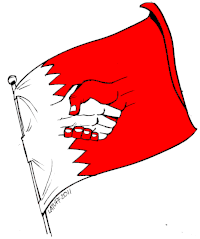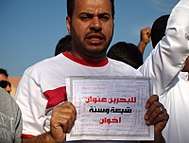Shia in Bahrain
Shia Islam in Bahrain forms 60% of the Muslim population in Bahrain. However, Sunni Islam is on the rise while the Shia population is declining. Most major Mosques in the country are Sunni as the ruling family practices Sunni Islam. According to the Washington Institute, the views of Shia and Sunni leaders in Bahrain are similar to their Arab neighboring countries.[1]
Population

Although in Bahrain more than half of population are Shia Muslim (estimated at over 60 percent), the Sunni royal family, Al Khalifa, governs the country.[2][3]
History
The people of Bahrain celebrated the victory of Iranian Revolution and formed gatherings to support it. In 1979, they wanted to participate in determining their own destiny by performing many protests against the Al Khalifa government. [4] Al Wefaq, as part of the Shia society in Bahrain, follows two goals: opposition to the current government in Bahrain and change the structure of society to based on rule of the people. Established in 2001, it was founded by more than 100 Shia scholars such as Ali Salman, Saeid Shahabi, Abdul Amir al-Jamri and Sheikh Isa Ahmed Qassim, leader of Al Wefaq.[4]
February 14 Youth Coalition
According to behavior of Al-Khalifa's government Shia activists prompted on February 14, 2011. They named that day as the Day of Rage and asked the people to protest against al-Khalifa's behavior at that day. The Al-Khalifa came into contact with the protesters and from that day widespread wave of Al-Khalifa's actions against Shiites has been performed, including the detention of women and men and children and their torture, the destruction of Shia mosques and cemeteries.[5]
Society

There are various sects in Bahrain, such as Baharna, Arab, Howala, Ajam, Asians. On the other hand, dominant political and official system in Bahrain are governed by Sunni people.[2]
According to the reports of The Guardian, when Āl Khalīfah family have begun to govern Bahrain, Shiites who have pieces of land, were changed to peasants. Now, High-ranking official positions belong to Sunnis and only few positions are ruled by Shiites. It is necessary to mention that in Bahrain the word of Sunni Muslim is not equal to reach people and shia means poor Bahrain people, but in the whole shia places in unsuitable economic situations.[2]
Shia scholars
Bahrain has an ancient and historic background which arise from the presence of Shiite scholars.[6] Some of them are listed as following:
Maitham Al Bahrani, Kamal al-Deen Maitham bin Ali bin Maitham al-Bahrani, commonly known as Sheikh Maitham Al Bahrani was a leading 13th Century Twelver Eastern Arabian theologian, author and philosopher. Al Bahrani wrote on Twelver doctrine, affirmed free will, the infallibility of prophets and imams, the appointed imamate of `Ali, and the occultation of the Twelfth Imam.[7] Yusuf al-Bahrani Yusuf ibn Ahmed al-Bahrani (1695–1772) (Arabic: يوسف البحراني) was a Bahraini theologian and a dominant person in the intellectual development of Twelver Shia Islam.[8] Isa Qassim Ayatollah Sheikh Isa Ahmed Qassim (Arabic: آية الله الشيخ عيسى أحمد قاسم) is Bahrain's leading Shia cleric and a politician. He is the spiritual leader of Al Wefaq, Bahrain's biggest opposition society. He was the leader and the founders of Islamic Enlightenment institution.[9]
See also
- Beit Al Qur'an
- Muharram in Bahrain
- Rashid Al Marikhi
References
- Pollock, David. "Sunnis and Shia in Bahrain: New Survey Shows Both Conflict and Consensus". washingtoninstitute. Retrieved 20 November 2017.
- Lulu, Tahiyya. "The real story of Bahrain's divided society". theguardian.
- Johnson, Thomas A. (2012). Power, National Security, and Transformational Global Events: Challenges. CRC Press. p. 194. ISBN 978-1439884225.
- Staff, Writer. "The formation of several movements in Bahrain". farsnews.
- Toby C. Jones and Ala'a Shehabi (January 2, 2012). "Bahrain's revolutionaries". Foreign Policy. Retrieved January 3, 2012.
- Bandarchi, Mohammadreza. "shia in Bahrain". pajoohe.
- Juan Cole, Sacred Space and Holy War, IB Tauris, 2007 p33
- Staff, Writer. "The Autobiography of Yūsuf al-Baḥrānī". University of California Press.
- Staff, Writer. "Bahrain strips Sheikh Isa Qassim of nationality". Retrieved 21 Jun 2016.
